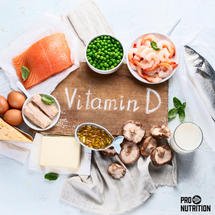Posted by Isaac Wirtz on 14th Sep 2022
Vitamin D: The Sunshine Vitamin
OUTLINE
-Benefits of vitamin D
-How it works
-Best type and dose
Vitamin D is an important part of human health. It is both a nutrient we consume as well as a hormone made by our bodies. Vitamin D is a fat soluble vitamin that helps with absorbing and retaining both calcium and phosphorus. Studies have also shown that Vitamin D can strengthen bones, fight infection, and reduce inflammation. It may also have additional health benefits as many of our bodies' organs and tissues have vitamin D receptors, which are being studied for further breakthroughs.
The primary natural source of vitamin D is production through the skin. This leads to many people having deficiencies due to limited sunlight in the winter, or lack of exposure from spending too much time indoors. People with darker skin tones can also suffer from vitamin D deficiency because the higher amount of melanin in their skin reduces vitamin D production, melanin also reduces the damaging effects of sunlight, including skin cancer. Most foods do not contain vitamin D naturally. Fish and eggs have the most, but you need to eat a lot of them to get close to current recommendations of 1,000-2,000 IU/day. So if you aren’t getting enough vitamin D through your skin, supplementation is the best solution.
The best known role of vitamin D is to help keep bones healthy by increasing the absorption of calcium in the intestines. When vitamin D levels are correct you can absorb 2-3 times as much dietary calcium. Low levels of vitamin D can lead to rickets in children and osteomalacia in adults, luckily both of these diseases are now rare in the U.S. Unfortunately, another bone disease, osteoporosis is on the rise. Osteoporosis is known as the thin bone disease and causes bone fractures and spinal deformities. Having low levels of vitamin D leads to low stores of calcium in bones, which can increase the risk of fractures.
Worldwide it is estimated that there are 1 Billion people who are deficient in vitamin D. Current recommendations for daily vitamin D intake to reach optimum serum levels vary between 800-2,000 IU daily depending on the organization. There are two forms of vitamin D supplements that are popular, D2, & D3. D2 is naturally produced by plants while D3 is naturally produced by the human body. D3 is often referred to as the body’s preferred form of vitamin D. This is because studies have found that D3 supplements tend to raise blood concentrations of the vitamin more, and sustain those levels longer than D2. In reality D2 & D3 are very comparable as both need to go through conversions in the liver and kidneys before it becomes the active form of vitamin D in the body.
In the past vitamin D deficiency was solved by simply going outside to get a good tan and letting your body do the rest. But due to modern life with most people working primarily indoors, and using sunscreen when outside to prevent skin damage, Vitamin D deficiency requires a modern solution. Daily supplementation of 800-2000 IU of either D2 or D3 will provide your body with all the vitamin D it needs, while still avoiding the harmful effects of the sun.
Fun Fact:
Getting sunlight in a sunny office or vehicle won’t help you obtain vitamin D, as window glass completely blocks UVB ultraviolet light (the type our skin needs to produce D3).

